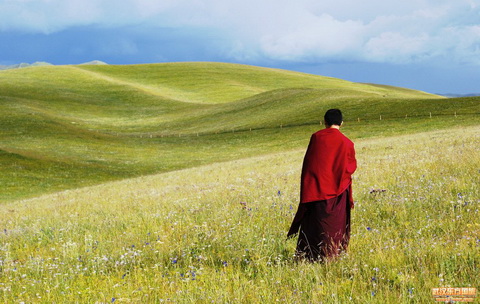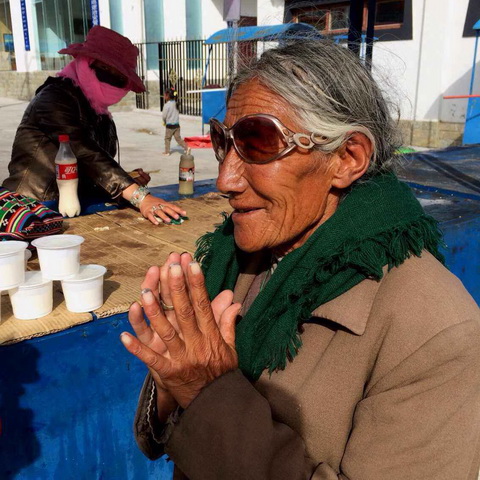 |
| Sangkoh grasslands in summer |
"On the ranch, grandmother felt like she could do anything. She was familiar with both the cattle and sheep, but in town she did not know how to use the washing machine, turn on the television, or use a cell phone. She was not accustomed to a leisurely lifestyle." Drongtso's grandson Tsering laughed while retelling her challenges in coming to town.
Drongtso lived in a village in the Sangkho grasslands in the Xiahe County, Gannan Tibetan Autonomous Prefecture of Gansu Province in. The herders settlements in the area referred to the local people as "New villages". The local government was implementing a project settling herdsmen who traditionally had roamed in pursuit of fresh grass and water for their livestock. Up to now, Xiahe County has built 1,907 new houses in which to settle 1,923 families of herdsmen totaling in 9,540 people.
Women on the grassland are all shy. When they see a stranger they will hide and whisper to one another, with short bursts of giggles. Drongtso continued speaking in Tibetan language about her life: it was a difficult life, filled with challenges surviving in harsh weather conditions. Cattle and sheep died in the fields. Food shortages were common.
Her grandson Tsering doesn't think much of his grandmother's speaking about her life. In fact, women here sometimes sat in front of the altar recalling beautiful memories from times past, but everyone would not go back to the past if they could.
They would all wait for the children until they were dismissed from school and make tasty food for them. The rest of the time they would chat, laugh, and stroll through the streets. They would listen to young people singing folk songs on the side of the street. They would sit and chat with the old man selling snacks of ethnic Hui group.
Drongtso sold off all of her cattle and sheep, left the village to work in town, and bid farewell to her difficult days. Drongtso explained: "I had never imagined I would be living so happily even in my dream when I spent the whole night searching for my lost cattle and sheep in the snowy mountains."
As night fell, smoke rose from the roofs of the settlements. Drongtso's stove was full of sheep manure, warming the room. Grandpa Gyatai sat cross-legged on the heatable brick bed drinking tea and watching the news. Their home's Buddhist altar was ornately decorated to honor the local Rinpoche, with butter lamps burning continuously.
The Sangkoh grassland is located 10 kilometers southwest of the Labrang Monastery, which is proclaimed as a "Global Tibetan Institution". Summer is the busiest time on the prairie when tens of thousands of Chinese and overseas tourists come to visit. Tsering and his classmate planned to open a herdsmen club where they could sell buttered tea, zanba, local homemade meals and accommodation for visitors. Last year, 1.12 million tourists visited the county bringing in 520 million yuan in tourism income, among which 45,400 overseas tourists made up 23.74 percent of the total numbers of visitors.
"Sangkoh's herders all have their own pastures, but many no longer use them for grazing cattle. Instead they use them for business by renting pastures out for fixed income," Tsering says.
At night, people bustle inside the teahouse on the street of Labrang Town and glowing lanterns with Tibetan characters lengthen people's shadows. On the roadside a Tibetan woman holds prayer beads in one hand and spins prayer wheels with the other, chatting with a woman of Hui ethnic group sit aside lively. If walk near them you will hear that the Hui people here can speak fluent Tibetan.
On the streets leading to the monastery vendors have their goods on display for sale. Three Tibetan youths sit on the floor playing a mandolin and singing grassland folk songs. The melodious and cheerful music has attracted a small group of backpackers and Buddhist monks who stop to listen.
As night quiets, the air cools. The grocery store next to Labrang Monastery is already closed. Only several young monks play football on the playground of the school next door, laughing. On this calm summer night everyone dreams of their own colorful prairies.
 |
| Blessings |